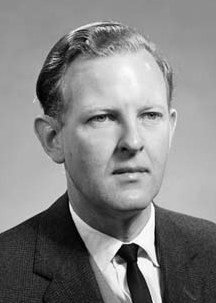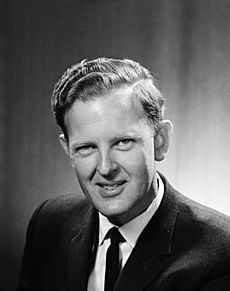Wylie Gibbs facts for kids
Quick facts for kids
Wylie Gibbs
FRCS
|
|
|---|---|

Gibbs in 1964
|
|
| Member of the Australian Parliament for Bowman |
|
| In office 30 November 1963 – 25 October 1969 |
|
| Preceded by | Jack Comber |
| Succeeded by | Len Keogh |
| Personal details | |
| Born |
Wylie Talbot Gibbs
26 July 1922 Queensland, Australia |
| Political party | Liberal National (in 1975) Progress (in 1977) |
| Spouse |
Audrey Wald
(m. 1947; |
| Relations | Harry Gibbs (brother) |
| Children | 8 |
| Alma mater | University of Queensland |
| Occupation | Surgeon |
Wylie Talbot Gibbs (born 26 July 1922) is an Australian former surgeon and politician. He was a member of the Australian House of Representatives from 1963 to 1969. He represented the area of Bowman in Queensland for the Liberal Party.
Early Life and Career
Wylie Gibbs was born on 26 July 1922. He grew up in Ipswich, Queensland. His father, Harry, was a lawyer and part of the Ipswich City Council. Wylie's older brother, Harry Gibbs, later became a very important judge in Australia.
Wylie went to Ipswich Grammar School. After that, he studied medicine at the University of Queensland. Before he became a politician, he worked as a flying doctor. This was in the Northern Territory Medical Service from 1947 to 1948. He also worked as a surgeon in London, Ipswich, and Brisbane. In 1951, he became a Fellow (FRCS) of two important medical colleges. These were the Royal College of Surgeons of Edinburgh and the Royal College of Surgeons of England.
Time in Parliament
Wylie Gibbs was chosen to be a member of the House of Representatives in the 1963 Australian federal election. He ran for the Liberal Party in the area of Division of Bowman. He won against the person who was already in the job, Jack Comber, from the Labor Party. He was elected again in 1966.
In August 1965, he used a special time in parliament called "question time." He pointed out that a senior government worker had different political ideas. Gibbs was one of three politicians who visited a country called Rhodesia in 1967. He often spoke up for Rhodesia in parliament. In 1968, he said that the United Nations was a "menace to world peace."
Gibbs often talked about health and social services in parliament. He believed the national government should take over all health services. He also wanted to remove a rule that checked how much money people had before they could get a pension. He also wanted free medical insurance for people with low incomes.
In 1969, a newspaper called The Canberra Times wrote about him. They said he often pushed for new ideas in the Liberal Party. Sometimes, his ideas sounded more like those of the Labor Party. Gibbs lost his seat in the 1969 Australian federal election. This was partly because of changes to the voting areas. Before the election, he voted with the Labor Party on a debate about voting areas. This is called "crossing the floor." He said the people who set up the voting areas were not doing a good job.
Later Life and Activities
After he lost his seat, Wylie Gibbs became a leader for a group of medicine makers. This group was called the Australian Pharmaceuticals Manufacturers' Association (APMA). He later left this job because he still wanted to be involved in politics.
Gibbs tried to be chosen again for the Liberal Party in 1973. He was one of 30 people who wanted to run in the 1973 Parramatta by-election. He was later chosen by the National Party to run for his old seat of Bowman in the 1975 Australian federal election. However, he decided not to run. He then joined a political group called the Progress Party before the 1977 Australian federal election. But he did not run as a candidate in that election.
Personal Life
Wylie Gibbs married Audrey Wald in 1947. They had three sons and three daughters together. Their marriage ended around the time he lost his seat in parliament. They divorced in 1975. Audrey, who passed away in 2015, became a successful artist later in her life. Sadly, two of their children, Harry and Rosamund, passed away before them. Harry passed away in 1979 and Rosamund in 1999. Wylie Gibbs later lived in Newport, Isle of Wight.
Works
Wylie Gibbs has written two books.
 | George Robert Carruthers |
 | Patricia Bath |
 | Jan Ernst Matzeliger |
 | Alexander Miles |


